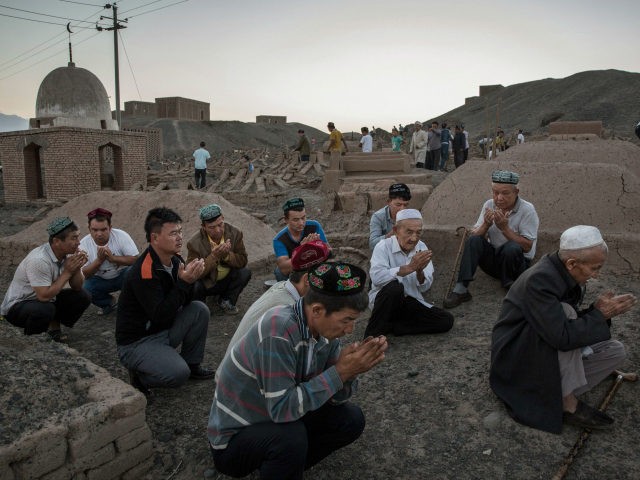Human rights activists have issued warnings that the novel coronavirus that originated in Wuhan, China, could pose a dire threat to prisoners in western China’s Muslim concentration camps, Radio Free Asia (RFA) noted on Thursday.
China is currently believed to be housing as many as 3 million Uyghurs, Kazakhs, Kyrgyz, and other Muslim ethnic minorities in over a thousand concentration camps in western Xinjiang province. There, survivors say they are subject to a litany of human rights atrocities, from sexual torture such as rape, forced sterilization, and forced abortion to traditional torture such as electroshock and sleep deprivation. Others have testified to being forced into slave labor, the fruits of which ended up in part in American stores.
Beijing has repeatedly called the camps “vocational training centers” and insisted that they are educational facilities where unskilled workers develop talents they can use to find jobs in the Chinese market. With jobs, Communist Party leaders have argued, Muslims will be less likely to be attracted to jihadist groups. Relatives of those imprisoned dispute this claim, identifying many prisoners who had successful careers before disappearing into the camps.
Chinese authorities have identified two cases of the Wuhan virus in Xinjiang, both reportedly middle-aged men. At press time, no reports indicate the men have died, but they have also not identified the men or their condition. Both cases are of men who recently traveled to Wuhan, which indicates they are not Uyghur Muslims, as the Communist Party subjects Uyghurs to extreme limitations on travel.
The Communist Party revealed on Monday that it had documented the genome of the new virus and shared it with global health experts to help prevent it from spreading further. Reports throughout the week indicate that Chinese officials had reason to believe the virus was dangerous and highly contagious before this time, however, and did not properly alert medical professionals handling the cases, causing the virus to spread much faster than it would have with proper protection.
There is no indication at press time that the Chinese regime has put any safety protocols in place in Xinjiang, much less in the camps. The Party alleged in December that all concentration camp prisoners had “graduated” from the “vocational centers,” so technically the Chinese government denies that anyone currently lives in these camps.
“The lives of millions of people will be at stake,” Dolkun Isa, the head of the World Uyghur Congress advocacy group, told RFA in an interview published Thursday. “We know for a fact that the conditions in the camps are horrible — many people have contracted serious sicknesses due to the overcrowded and filthy conditions.”
“China should do everything in its power to prevent the spread of the Wuhan virus into any camps because the consequences will be catastrophic, resulting possibly in the deaths of tens of thousands of Uyghurs arbitrarily detained in the past three years,” Isa added, urging China to allow global health organizations such as the International Red Cross and the World Health Organization (WHO) to access the camps.
The WHO has already effusively praised China for its response to the outbreak and banned Taiwan, at China’s behest, from contributing to global virus containment, making it an unlikely partner to secure the camps.
Beijing has repeatedly sought an Interpol red notice, or call for the arrest, for Dolkun Isa in response to his group’s call for respect for the human rights of the Uyghur people, with no success. Shortly after the president of Interpol, Meng Hongwei, refused to grant the red notice, Beijing detained him without notice and disappeared him from the public eye. This month, over a year after his disappearance, China announced the judiciary had sentenced Meng to 13 years in prison on nebulous corruption charges.
RFA noted that several other observers of China’s concentration camp projects warned that the Wuhan virus spreading in such a contained location could result in “disaster,” speeding up China’s systematic genocide campaign against the Uyghur people.
Survivors of the camps have revealed that their primary objective appears to be indoctrination. Prisoners are forced to learn Mandarin and abandon the Uyghur language, give up their faith, and worship the Communist Party. Guards teach songs worshipping dictator Xi Jinping and praising the Party, and the few released from the prison are those who “prove” to authorities that they have internalized the indoctrination and will serve the Party loyally in the outside world.
Slavery is also a key pillar of the concentration camp system. In October, Uyghur issues experts revealed evidence that prisoners at the camps were manufacturing baby clothes sold by a company that did business with the American chain store Costco, which cut ties with the company after activists revealed that the clothes in question were made by slaves in Xinjiang.
China is “turning its internment campaign into a business of oppression … they will be able to undercut global prices and turn ‘Made in Xinjiang’ into a multi-billion-dollar business model,” Adrian Zenz, a non-resident senior fellow in China Studies at the Victims of Communism Memorial Foundation, told the Congressional-Executive Commission on China.
The WHO has confirmed 902 cases of the Wuhan virus worldwide and 26 deaths, the latter all in China. Over 90 percent of Chinese provinces have documented cases. Singapore, Japan, South Korea, Vietnam, Thailand, Taiwan, Hong Kong, and Macau also isolated individuals that have tested positive for the virus.

COMMENTS
Please let us know if you're having issues with commenting.